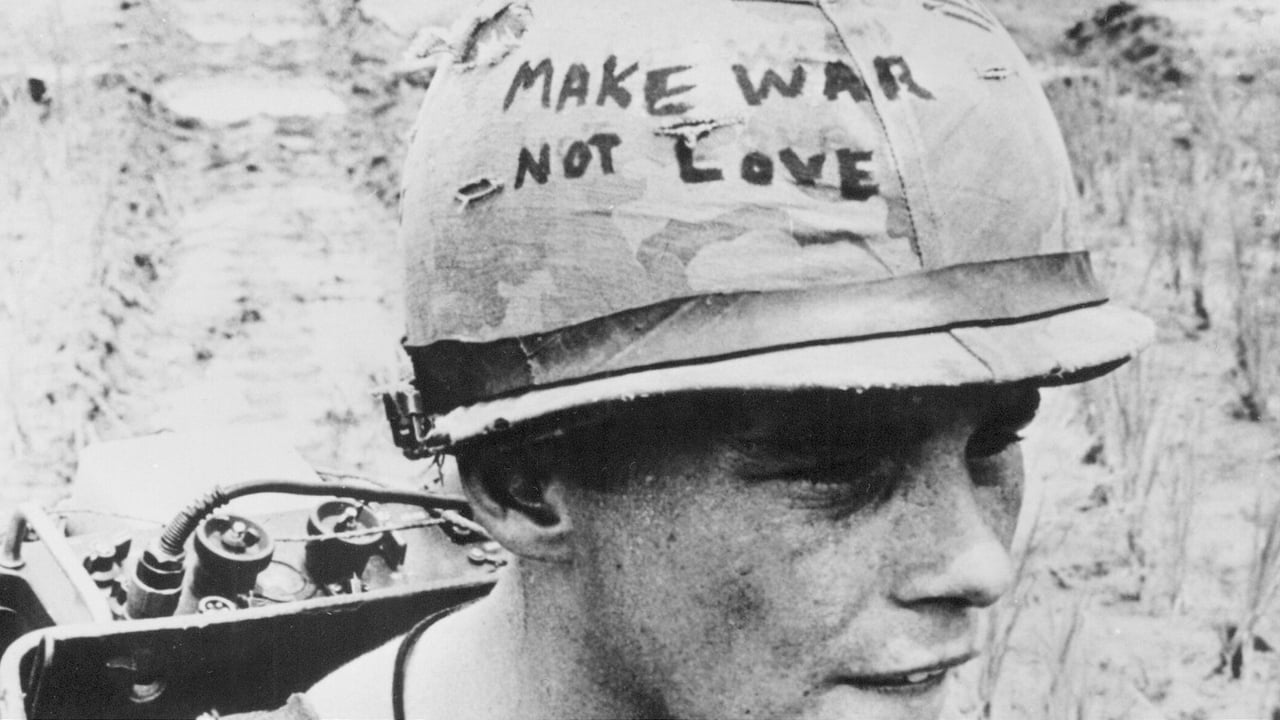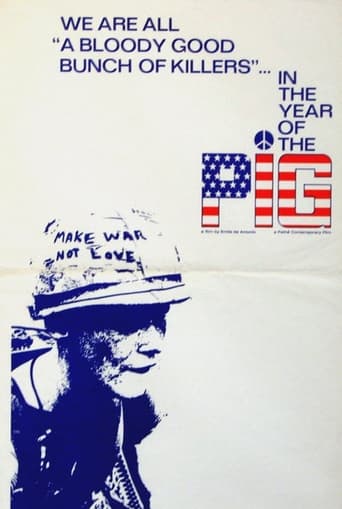

Emile de Antonio was the godfather of independent, political documentaries. His films all deal with the power structures of Cold War America, and all have Maxist overtones."In the Year of the Pig" is regarded as Antonio's best film. A Michael Moore styled attack on America's foreign policy and propaganda campaigns during the Vietnam War, the film was funded by the French and a group of Marxist rebels.Antonio's ironic use of music would be emulated decades later in films like "Born on the Fourth of July", "Coming Home" and countless other shallow Vietnam war flicks. The film asserts that Vietnam was always a single country, explained how the United States refused to recognise the Geneva Accords which facilitated North/South unification, goes to lengths to highlight the fact that the US treated the conflict as a proxy war against Communism and/or egalitarian movements, details the various puppet leaders supported by Washington, documents the United States' attempts to prevent local elections and provides insight into the government's increasing control of the media.Upon release, "Pigs" was greeted with hostility, with numerous bomb threats directed against theatres which promised to show it. Today, the film is mostly interesting for the way it foreshadows the Iraq war.Both the Iraq and Vietnam wars were, of course, founded on lies. In Vietnam, the original lie was that a poor nation of pre-industrial age farmers posed a threat to the mightiest empire the world had ever known. The Gulf of Tonkin hoax was the manufactured excuse to jump in with all guns blazing, and the Pentagon Papers were the irrefutable proof used to back up all US military decisions.With Iraq, the same thing happened. The 9/11 attack became the new flash-point, when in fact it had nothing to do with Iraq. CIA papers were then used to convince populaces that a band of low-tech Arabs possessed "Weapons of Mass Destruction". The truth was, these weapons didn't exist, and what primitive weapons they did have, were sold to them by the US in the first place. Not to mention that Saddam Hussein was, for several decades, a Western puppet, financed specifically (and encouraged to wage war on Iran) so that the West could control their regional interests after the loss of Shah Reza. Like Vietnam, Washington then began to disseminate a constant supply of buzzwords: "Al Qaeda", "terrorists", "9/11", "global terror". The message was clear. Like Vietnam, we had to ship "our boys over" and "clean up the place". In Vietnam the US broke the Geneva convention whilst in Iraq the US broke the UN resolution. The world said stop, but Uncle Sam went on in anyway. Their laws aren't our laws.Both wars quickly became long-term guerrilla conflicts, a style of combat which American forces were untrained for. Both wars also used the fictions of "democracy" and "freedoms" to pacify the American public. In Vietnam, "democracy" took the form of a gang of wealthy Catholic dictators running a country of poor, rural, Buddhist peasants. In truth, it was a proxy war against the Soviets. The US wanted to expand the global market, the Vietnamese wanted land reforms and self determination. This is not an isolated incident. Over the past century, the US has invaded or meddled in over 70 countries across Asia and Latin America, in each case brutally taking down left-leaning or egalitarian populace movements. To do this they supply or support fanatical rebels. When these rebels get in power, the West is given resource rights (and an excuse to invade at any moment, as their puppet can easily be demonized in the future). If the left-leaning movement gets into power, the West's approach alters. The country is isolated, embargoed, strangled and demonized. See Iran, Cuba and Korea. Back to Vietnam: After the US had its puppet (Diem?) assassinated in 1963, it took two years and seven different governments before a suitably brutal but still lovable figurehead could be found.A similar situation occurred in Iraq, a "governing council" of US-appointed stooges pretends to represent Iraqi interests by handing over almost all industries to large U.S. corporations (all of which just happen to be donors to the Republican party).Both wars were also against victim nations already scarred by Colonial domination. Vietnam was dominated for over a century by the French, Japanese and Americans. Likewise, Iraq bears the scars of a repressive colonial legacy. It was created in the aftermath of World War I, literally carved out of the sand by the British for the sole purpose of controlling the world's oil supply. The US helped Saddam Hussein's party overthrow the government in 1963 but its purposes were the same as the British's: to control oil.Finally, and most importantly, both wars are an attempt by the USA to maintain world power by containing the growth of rival ideologies. Vietnam, Afganistan, Korea and WW2 were all proxy wars with Russia. Had Vietnam fallen, fears were that communism would spread to Cambodia, India and China. In Iraq, the grand strategy is global hegemony. Iraq is simply the first tactical step in the Neoconservative vision. With a constant presence in the Middle East, Iran and Saudi Arabia will be kept at bay, and the US will be free to project its military might throughout the Persian Gulf, site of 55 percent of the world's oil.Antonio's documentary doesn't go into all these details, but it does break the Vietnam conflict down clearly and highlights exactly what and why things happened. This was the first real independent political documentary and so its sort of become a classic of its genre. But today its real value is more in how it relates to our current world. It's a mirror for our times.8.5/10 - Note that Francis Ford Coppola freely admits that he ripped "Apocalypse Now's" Wagner sequence from Antonio's "Pig".
... View MoreWorth the time to revisit especially in today's money-making military-industrial complex. Colonialism & imperialism are often ugly: be prepared for disgust as this work adeptly weaves historical footage (lots of white-male talking heads) as a means to untangle the complicated mess of the Vietnam War. The approach is decidedly anti-war; the effect is certainly thought-provoking; and the visceral reactions of the work's first audiences probably speaks to the filmmaker hitting a nerve--perhaps the same nerve most humans have when confronted with such an ugly truth about themselves that hostility & denial ensue.
... View MoreThis is one of the finest documentaries ever made. It is essential for Americans and Europeans to view this work about our crimes and mentality upon and toward Indochina and its nations and peoples, the focus here being Viet Nam. The gathered archive footage is superb and this work in itself has languished unseen for decades now restored on DVD. Which comes with a very well written booklet essay by Douglas Kellner who illuminates the differences between how Emile de Antonio approached the subject versus the establishment media. The latter always presenting the world with that "voice of god" narrator that is entirely absent from IN THE YEAR OF THE PIG.One word of caution, understand that the events were still going on during the making of these interviews and there was facts about goings-on inside the oval office under Eisenhower, JFK and LBJ (the film is pre NIXON admin ) that were not only not known to journalists but even Whitehouse or admin employees who were out of the particular loop. Facts that have since been revealed in declassified documents or candid confessions of top tier insiders. This is particularly true about JFK and the blinding light of the post assassination mythology that made even down to earth journalists reluctant to attribute blame to Kennedy. So my tip is when you watch try and see through their reluctance to blame and willingness to imply and believe a wonderful world that would have been...if only on that day in Dallas...remember there was no Vietnamese conflict prior to Franco-American imperial interference in Viet Nam. It was not a Vietnamese made conflict it was an imperial one made by external hands.
... View MoreIn The Year of the Pig is as important to narrative cinema as it is to documentary cinema. The raw and powerful anti-Vietnam (note- De made the film in 1968 and not in the 80's or 90's like directors such as Stone or Kubrick) documentary is composed of archival footage, interviews done by De himself, and an amazing soundtrack done by a student of avant-garde composer John Cage. De first tackled didactic montage in Point of Order and he all but masters it in this film. Imagine this- war torn American soldiers, legless and bloody, being carried off the battlefield while "Old Glory" is being played on timbas and other Indonesian instruments. It is so anti-American, anti-War, and brilliant. This film is a seminal piece of work in the New American Cinema and should be preserved for generations to come.
... View More